Photo source: Makeyev SRC press office
Legendary SUSU alumnus, founder of the Russian school of naval rocketry, member-correspondent of the RAS, academic of the Russian Academy of Rocket and Artillery Sciences, academic of the International Academy of Astronautics, and general director and designer of the V.P. Makeyev State Rocket Center Vladimir Degtyar congratulated the Faculty of Aerospace Engineering of his alma mater with their 60-year anniversary. In an exclusive interview, Vladimir Grigorievich shared strategic plans for enterprise development, talked about work with the university and the staff reserve, thanked his mentors, and shared his memories of student life.
- Which universities are the backbone for the State Rocket Center? Does SUSU’s level, in your opinion, match the global level? What could be improved in specialist training programs for the rocket industry?
- For us, SUSU is the main university for training highly-qualified specialists. We receive the greatest number of young specialists in the design specialties that we need from the main university and from the Miass branch. We also work with CSU to fill our theoretical divisions. We are developing partnerships with MAI, KAI, and USATU. SUSU’s academic level is one of the highest in Russia and absolutely matches the global level, evidenced by the demand for SUSU alumni in our country and abroad. Without question, the process of improving rocket industry specialist training programs must constantly move forward, and we pay very serious attention to this, developing our practically-oriented models of education which are highly recommended as a modern format for student training.
- What joint developments are planned (or are in process) between SUSU and the SRC?
- Scientific cooperation between the SRC and SUSU began in the 1960s and continues to this day. Annually, SUSU completes a large number of research projects by contract with the Makeyev SRC in priority areas of development for our company. Today we are making a big step forward for the development of our scientific cooperation – the advancement of, as they’re called today, megaprojects together. Within the 5-100 Project, such cooperative megaprojects will include searching for solutions to the issue of protecting the Earth from asteroid and comet threats. Chelyabinsk residents were assured of the reality of this threat first hand. Our company has a large scientific and technical head start in this issue, and I hope that we can achieve new results in the solution of this global problem for humanity together with SUSU.
Photo source: Makeyev SRC press office
- What significance does the SRC place on training future staff?
- The company has approved and implemented a program for training staff, including career guidance, task preparation, improving specialists’ qualifications, and training research staff. A large part of realizing these programs is allotted to universities, including SUSU. One of these joint events was held on April 8th at SUSU – the student aerospace Olympiad, for which SRC is a co-organizer and the main sponsor.
- How are staff chosen for the SRC? What competencies do graduates need? Professional? Moral and ethical?
- Human resources constantly monitors the divisions, especially specialists’ wellbeing, taking departmental staff needs for completing their tasks and work volume into account, and annually puts together an application for employer-sponsored education at universities according to the state plan for employer-sponsored education of specialists for the rocket and space industry and hiring of graduates. The training cycle moves continuously from career guidance work in schools to the selection of university graduates for hiring at the Makeyev SRC. Our requirements for young specialists are quite high: they must possess absolute mastery over the range of skills provided for in each academic program and comply with the requirements of the Makeyev SRC Code of Ethics and Work Behavior. Students of the Faculty of Aerospace Engineering have a unique chance to test their compliance to these requirements and get a good stimulus for improvement by completing various practicals at the Makeyev SRC.
Photo source: Makeyev SRC press office
- How dynamically is the rocket building industry developing in Russia? Are we, in your opinion, on the front lines compared to colleagues in foreign countries?
- The achievements of Russian rocket building are well known. Suffice to say that the Sineva and Lainer rockets, which were developed at the SRC and serve as the basis for Russia’s strategic naval nuclear force, have the highest levels of mass performance among all international and Russian strategic rockets. Our space-rocket industry also holds the leading position around the world, including in quantity of space-launch vehicle launches. Just in the last years the newly-built Vostochniy Cosmodrome took flight, having completed the first flights of the Angara family space-launch vehicles, and a project is being developed for super-heavy space-launch vehicles for flights to the Moon, Mars, and more which allows us to successfully compete with different countries with a rocket industry.
- What are the highest priority areas of development for the SRC in the next 10 years?
- The new tasks for forming the face of strategic nuclear force deterrence presented by country’s leadership to Makeyev SRC once again confirm the company’s high level of scientific and technical potential and its authority as the strongest scientific design center for the development of space-rocket technology in Russia. At this time, the SRC is conducting design and experiment development for the creation of a strategic silo-based rocket complex. Work is continuing in the improvement of strategic naval nuclear force and the conferment of new characteristics to ballistic submarine rockets. One new area is the development of hypersonic aircraft which is the priority for the aviation and space-rocket technology sectors.
Space-rocket projects are an important aspect of work for the company. By order from the aerospace corporation Vozdushniy Start, the SRC is developing a promising air-based space-rocket complex which will allow for the launch of satellites to various orbits without using expensive land-based launch complexes from practically any airspace around the world.
Within the federal space program, a technical program for the Rus-M space rocket complex was developed for launching from the Vostochniy Cosmodrome in the Amur region in cooperation with the Progress Central Assembly and Design Engineering Bureau and the Energia Rocket and Space Corporation.
The space-launch vehicle KORONA is being developed within R&D for an orbital space rocket, a single-stage launch vehicle. The KORONA space-launch vehicle is a completely reusable, single-stage launch vehicle for vertical launch and landing. Today, the Americans have developed soft-landing technologies for the first stage of the Falcon space-launch vehicle and its repeated use for a rocket. Our development, the KORONA space-launch vehicle, unlike the American vehicle, does not have separate stages and is a soft takeoff and landing spaceship, which opens up the road to executing long-distance, interplanetary flights with crew on board.
- Are there SUSU graduates among your staff you can boast of?
- More than one-and-a-half thousand SUSU graduates are working at the State Rocket Center, and more than three hundred of them graduated from the AE Faculty. These specialists make up the core of the company’s staff, develop every area of the SRC’s work, and have managerial positions of various levels. We can celebrate both company’s honored veterans and the younger generation who are graduates of the renowned ChPI-SUSU.
Photo source: Makeyev SRC press office
- You lead the aeronautical engineering department at SUSU, are you able to dedicate enough time to research and academic work?
- Without question my main workload as general director and general designer is tied to completing governmental defense orders and ensuring the stable cooperation of our enterprises and designers. But training scientific and engineering staff is no less important – this is the key to a company’s development, and to that of the industry as a whole. So, the key moments of the department’s work – supporting the academic process and scientific research work – are always under my control for timely decision making. With the development of telecommunications, it became possible to hold departmental meetings remotely, which allows us to solve all current issues of the department’s leadership in real time. Of course, I always try to find time to come to the university, to the department, if my personal involvement is necessary at an event.
- You graduated from Chelyabinsk Polytechnic Institute (now SUSU) with the major “Aircraft Manufacturing”. What has your education from this university given you, and do you remember your professors?
- I remember that it was difficult, but interesting, to study. The unique thing about the academic process at the Faculty of Aerospace Engineering is the in-depth study of practically all areas of technical sciences, since rocket technology is their symbiosis. The fundamental level of student education in the Faculty of Aerospace Engineering is ensured by professors the highest qualifications, many of which have dedicated themselves to the honorable work of training rocket engineers for more than 50 years. I would like to note, with thanks, the long-term, dedicated work of professor L.A. Shefer and associate professors Yu.M. Hishenko, G.S. Chernoglazov, R.V. Sidelnikov, S.V. Makhnovich, and A.M. Murzin.
- You head the national school of naval rocket building, you are a noted authority in the academic sphere, and you have many titles and awards. What would you like to wish future SUSU graduates for their professional future?
- First and foremost, diligence and patience when mastering the range of skills and knowledge necessary for successful work and professional growth in companies of the space-rocket industry. The most important thing is staying true to your profession and constant improvement in the area you chose – only along this path can you become a high-class specialist and make a significant contribution to the strengthening of our motherland’s might. I’d like to congratulate all of the illustrious staff of SUSU and the Faculty of Aerospace Engineering with this fantastic holiday – Cosmonaut’s Day and the 60-year anniversary of the faculty, and wish them new creative achievements for the good of our motherland, happiness, and success.







